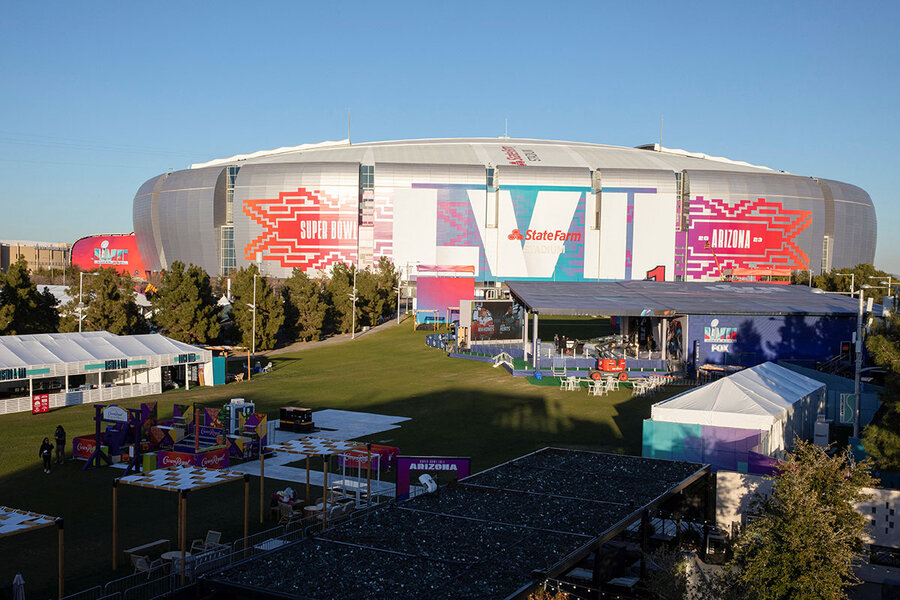Parties, merch, and joy: An underdog city gears up for the Super Bowl
Loading...
| Philadelphia
Known as the underdog city to many, Philadelphia is a blue-collar town with hardworking people who wear the success and failure of sports teams not only on their faces but also in their hearts.
The city experienced a record-breaking number of homicides in 2021, amid an ongoing battle with crime. But when sports teams win, neighborhood tribalism gets swept to the side and more hugs and high-fives get exchanged, like gifts on Christmas morning.
Why We Wrote This
A story focused onWhat happens when a city that contends with an “underdog” label has a football team headed to the Super Bowl?
Game time is a few short days away for Super Bowl LVII and optimism abounds. Mention the possibility of the Philadelphia Eagles losing to the Kansas City Chiefs, and smiles quickly fade into quizzical expressions of “Why would you even ask that question?”
Fans here have already engaged in some of the boisterous celebrating they are known for – including climbing poles that the city has intentionally greased. Their revelry isn’t easily discouraged.
“Right now this is the biggest thing for Philadelphia,” says Domenic Romano, a lifelong South Philly resident, as he sells shirts and hoodies ahead of the big game. “We need this.”
Game time is a few short days away around these parts. Everybody here in Philadelphia thinks that the Eagles are going to win Super Bowl LVII against the Kansas City Chiefs. Mention the possibility of them losing and smiles quickly fade into quizzical expressions of “Why would you even ask that question?”
Excited Eagles fans gathered in the middle of Lincoln Financial Field, known as “the Linc,” Sunday morning to give the team a joyous pep rally before they boarded a flight to Arizona. Partying in Philly started the night the Eagles punched their ticket to the big game after the NFC Championship on Jan. 29. As they did during the Phillies’ 2022 World Series run and the Eagles’ last Super Bowl appearance in 2018, city employees greased light poles so boisterous fans wouldn’t climb them and potentially hurt themselves. It didn’t work.
“I knew that it was going to go down out there, that’s why I had to go,” says Omar Torrance, as a smile washes over his face. He is a barber at South Street Barbers, where some Eagles players have gotten haircuts.
Why We Wrote This
A story focused onWhat happens when a city that contends with an “underdog” label has a football team headed to the Super Bowl?
Mr. Torrance watched the NFC championship game with a friend in South Philly, 2 1/2 miles away from the Linc. His friend’s house is also two blocks away from Broad Street, where much of the partying happened.
“They had a DJ out there and everything,” he says. “We went down there and within 45 minutes to an hour, the crowd just kept getting bigger and bigger. They were walking up from the stadium. People came out of their houses. It was kids, older people, Black, white, and everybody in between just giving high-fives and dancing, and it was all peaceful,” Mr. Torrance says.
Known as the underdog city to many, Philadelphia is a blue-collar town with hardworking people who wear the success and failure of sports teams not only on their faces but also in their hearts. The city experienced a record-breaking number of homicides in 2021, amid an ongoing battle with crime. But when sports teams win, neighborhood tribalism gets swept to the side and more hugs and high-fives get exchanged, like gifts on Christmas morning.
“People want to associate with winners,” says Daniel Funk, associate dean and professor at Temple University’s School of Sport, Tourism and Hospitality Management. “We have a term called ‘basking in reflective glory,’ so when a team wins I want to wear a hat, and people will see me wearing that hat and say, ‘They’re winners therefore I’m a winner,’ ” says Dr. Funk, who adds that the Super Bowl has fueled timely discussions on sports marketing and management in his classes.
He says people want to build identities or a brand.
“When you identify with sports teams and professional teams, the more they win, the more it activates your ability to publicly demonstrate your identity to others. And when you live in a place like Philadelphia or Boston, there’s this region theory that says you mainly follow teams that are close to you in proximity,” Dr. Funk says. “You choose to activate that identity, and it really helps if they are winners.”
Reflective failure, he says, can cause people to distance themselves. Winning and losing, he says, separates fair-weather from hardcore fans.
“Most people are casual viewers, and there are fewer hardcore fans. Most people get on board because you heard someone talk about the Eagles at work, a religious service, or the grocery store, but you’re not willing to lose sleep over it because it doesn’t threaten your identity,” Dr. Funk says. “But if you’re a hardcore season ticket holder and your closet is filled with Eagles gear, it’s pretty hard to disassociate yourself, so there’s a bit of an identity threat when your team loses.”
Philadelphia is no fair-weather city. Two seasons ago, when the team won only four games in the midst of a pandemic, fans kept the faith through Zoom meetups and socially distanced parties.
The thing about the Eagles this year is that no fan thinks they can lose, as opposed to 2018 when they played Tom Brady and the then-vaunted New England Patriots and no one thought they would win. Stroll down any street and you’ll see people in team jerseys, caps, and hoodies. Stores like Shibe Vintage Sports near Center City have shuffled patrons in and out leading up to Sunday’s game, at times filling more than 100 daily online orders of popular Eagles paraphernalia.
“Business has been booming,” says manager Darren Nowicki. “This is an Eagles town and fans have been flocking to us. We have been working around the clock trying to get products in.”
Their recent bestsellers have included a T-shirt featuring quarterback Jalen Hurts, and a couple retro hats and Kelly green shirts centered with a soaring eagle.
“We’re doing well. Our sales numbers for a weekend are like what we usually do in a month,” Mr. Nowicki says. “For us as a local business, this is an extremely valuable time.”
Does the store have original Eagles gear planned for a Super Bowl victory? Yes. Will folks there share the design pregame? Nope. But they will be pressing shirts as soon as Sunday’s game ends.
Francisco and Jennifer Staton stopped in Shibe to buy shirts for their son and two daughters. Mr. Staton came dressed for the occasion in an Eagles cap. “You could tell there was something special about the team chemistry from the beginning of the year,” he says. “They’ve been doing things the right way all year.”
The Statons moved out of the city, but still visit often. Ms. Staton, who says her husband is a die-hard fan, says that she’ll come back with him to a Super Bowl parade, but that she won’t climb any poles. And, they aren’t turning their noses up at revelers who expressed their excitement by climbing.
“I think it’s just the passion,” Mr. Staton says. “That’s what Philadelphia is, with the underdog mentality.”
Another person who’ll have his Super Bowl specials ready is Domenic Romano, a lifelong South Philly resident. Some afternoons before he heads to work as a waiter, he treks to the Italian Market, famous for scenes in “Rocky,” and sells his wares. With the birds heading to the big game, he is selling every shirt and hoodie with a smile.
“You have such a great city here, and with the little bit of bad things that go on, this is something that is goodness and happiness and love. It brought us together,” Mr. Romano says. “Everything that brings excitement – especially from a Philadelphia sports team – and can bring everybody together is a blessing.”











